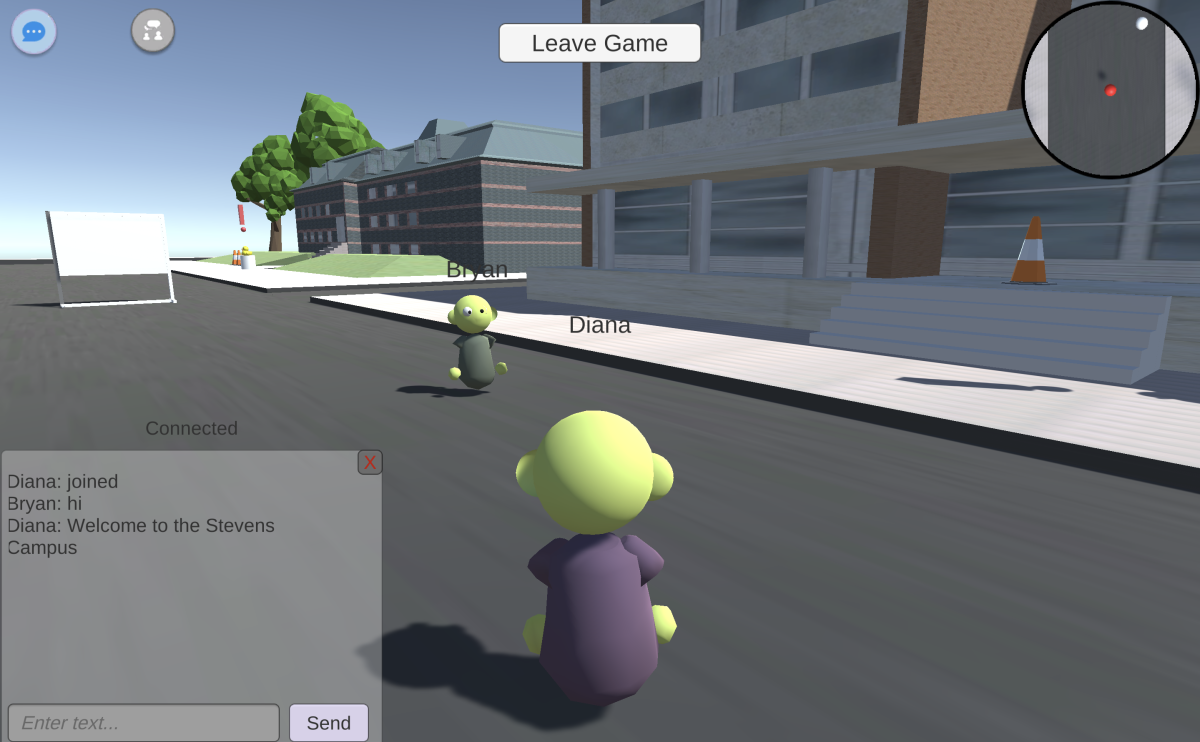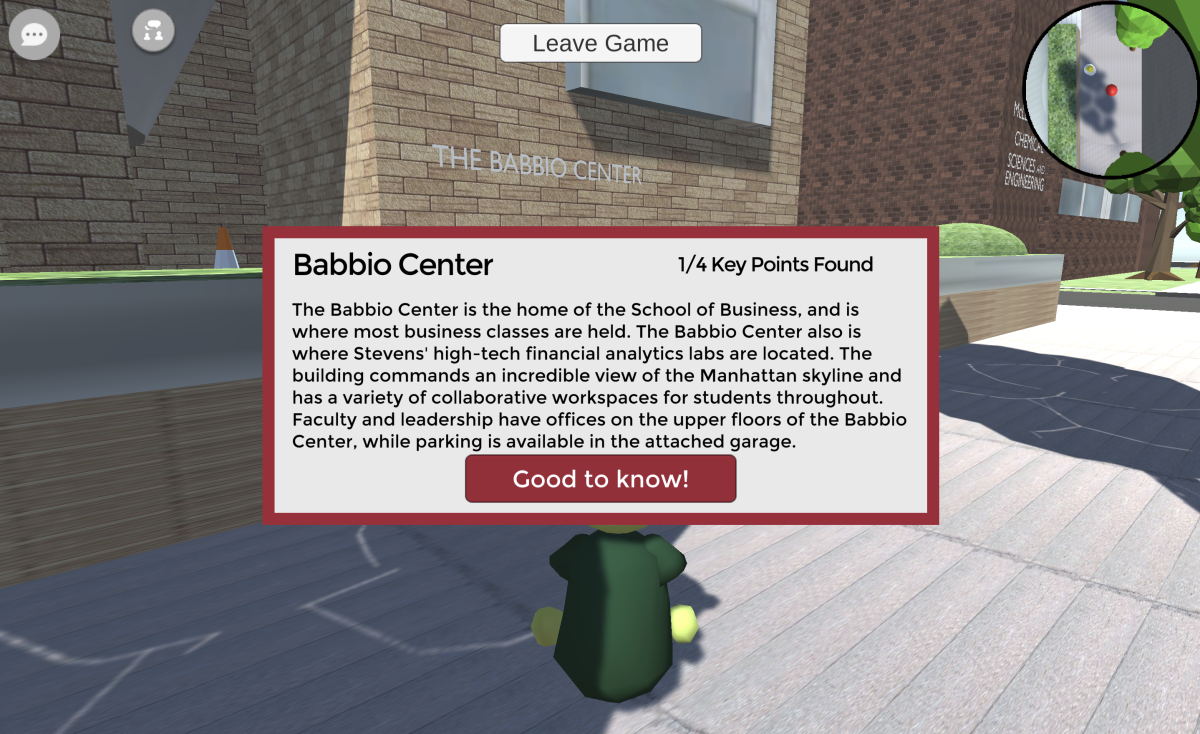From Paterson to the Metaverse: Stevens Student Aims To Close the College Campus Tour Gap
Imagication, a platform for virtual campus tours in the metaverse, is inspired by passion and powered by Stevens’ Launchpad program
Every year, high school students go on the road — typically accompanied by their parents — to partake in what could be considered a rite of passage: college campus tours.
But for high school seniors from disadvantaged backgrounds, the college campus tour is a luxury beyond their reach.
Imagine a student from a disadvantaged school in northern New Jersey with an impressive academic record who dreams of enrolling at a college far away, like in sunny California. How can this student, already facing the obstacle of high tuition costs, get to visit a college campus when paying for transportation, accommodations and other travel expenses is not even a viable option?
Stevens computer engineering major Diana Rosado ’24 personally understands this challenge.
“When it came down to college searching to see what college was right for me, my parents told me that my options were limited geographically as far as visiting campuses,” she said. “They said, ‘We can’t really just travel across the country and take off work just like that.’”
Rosado was a standout student with an exceptional academic record at Passaic County Technical Institute in Wayne, New Jersey, not far from her hometown, Paterson. So much so that Rosado’s teachers recommended her for iSTEM@Stevens, an exclusive entrepreneurship training program for incoming first-year students that provides them with the opportunity and skills to design and build technologies and businesses. The program dovetails into the Launchpad@Stevens program, which accepts students who are already enrolled at Stevens.
Rosado’s options for visiting schools across the country were limited, but she was fortunate to have found out about Stevens through a school field trip.
“I decided Stevens was right for me on that field trip,” she said. “I love the school and this campus.”
Realizing that not every student has this type of opportunity, Rosado wanted to help change the calculus for students from disadvantaged neighborhoods.
“What if the school of their choice was somewhere on the West Coast, but they could never afford to travel there?” she asked. “Or how about international students who decide to take a gamble — a financial risk — to go to a college in the U.S. but may never have an opportunity to visit a college campus beforehand to see if it’s a good fit for them?”
According to Rosado, students unable to participate in on-campus visits are missing out on the experience of engaging and learning whether a school is right for them.
“That is so important for students,” she said. “If they’re planning on going to college, they should at least figure out what’s out there and why they should attend a particular school.”
With a passion for helping level the playing field for all students, Rosado co-founded Imagication, a startup offering an innovative platform to build college campus tours in the metaverse.
Why the metaverse? Because it’s a nascent technology creating opportunities to enhance user experiences online.
For example, while most colleges provide online tours with pictures and text that describe the campus, they fall short of delivering a fully immersive experience akin to an in-person campus visit.
“Students don’t get to walk around and interact with current college students,” she said, highlighting the shortcomings of the typical two-dimensional online campus tours. “Simply clicking and reading about a school and its campus does not equal actual engagement for the student.”
Eventually, many students lose interest and exit the tour without completing it, Rosado explained.
But with Imagication, students can walk around a college campus online and interact with other students, without having to download any software.
Building a startup goes beyond technology skills
Rosado certainly has technical know-how and an innate entrepreneurial spirit. Still, passion is the heart of building a startup that garners attention and makes a societal impact, she said.
“You need passion and grit to persevere because you’re going to have hundreds of rejections from people who may not think it’s ready yet,” she said. “But you must push through and find the one person who says yes.”
While in the Launchpad@Stevens program, Rosado learned the fundamentals of building a startup. But she also took the initiative to expand her knowledge of user interface and user experience (UI/UX) design in her free time outside the classroom. According to her, UI/UX helps make solutions more accessible, functional and aesthetically pleasing.
Free time is a luxury for Rosado, who, in addition to being a full-time student and active co-founder of Imagication, also works a full-time co-op job.
For Rosado, the desire to make a difference has always been part of her.
“I have an unyielding passion for education,” said Rosado, who was involved in Stevens Math Circles for two semesters, teaching math to students from grade school.
“Throughout my experience, I realized that, as an educator, you have the power to make a difference in a student’s life,” she said, noting the importance of elevating students’ curiosities to pursue STEM careers despite difficulties.
Likewise, she wants to help close the gap between students who can visit college campuses and those who cannot.
Today, anyone can use Imagication to visit a virtual Stevens campus, but the platform is evolving to include other college campuses.
As for life after Stevens, Rosado envisions a career where she can continue building Imagication and leverage her passion and entrepreneurial spirit to help others access what otherwise seems inaccessible.
Two questions drive her forward in her career as she sees it, she said. “How can I make an impact in the education space? And how can I make an impact in my community?”



